Fr. Ricardo Chinchilla, CJM
The parable of the Pharisee and Tax Collector shows us the grammar of prayer. The rules are simple and apply to everyone.
The first rule: If you put the “self” at the center, no relationship will work—not for couples, not with children or friends, much less with God. We live and pray to advance on the same profound path: the never-surrendered search for someone so important that the “You” has to come before the “I.”
The second rule: one prays not to receive but to be transformed. The Pharisee doesn’t want to change; in his mind, he doesn’t need to. He’s all right, the others are wrong, and maybe so is God. But, on the other hand, the tax collector is not happy with his life, and he hopes and wishes he could change it tomorrow—maybe just a little bit at a time. And all of who he is becomes a living supplication, putting his body, heart, hands, and voice into play: he pounds his chest and lets out words of supplication to the God of heaven. The tax collector went home forgiven. Not because he was more honest or humble than the Pharisee, but because he opened himself to God (like a door that is ajar in the sun, like a sail that arches in the wind), entering into him with his mercy, this extraordinary weakness of God that is his unique omnipotence.

